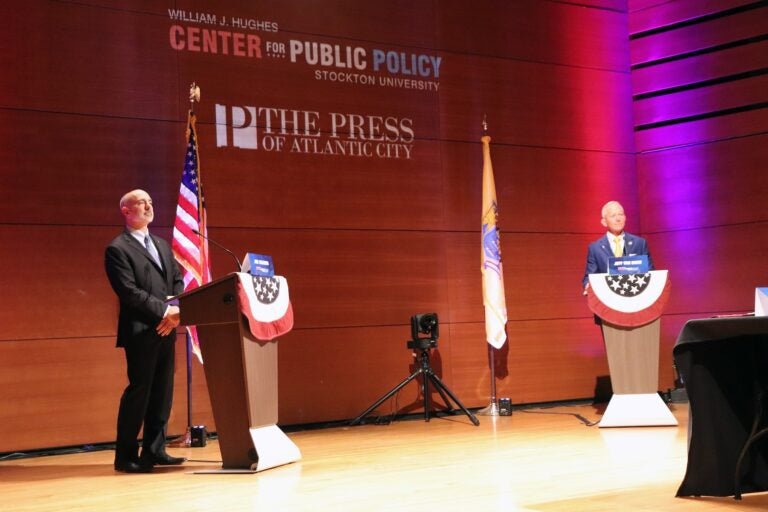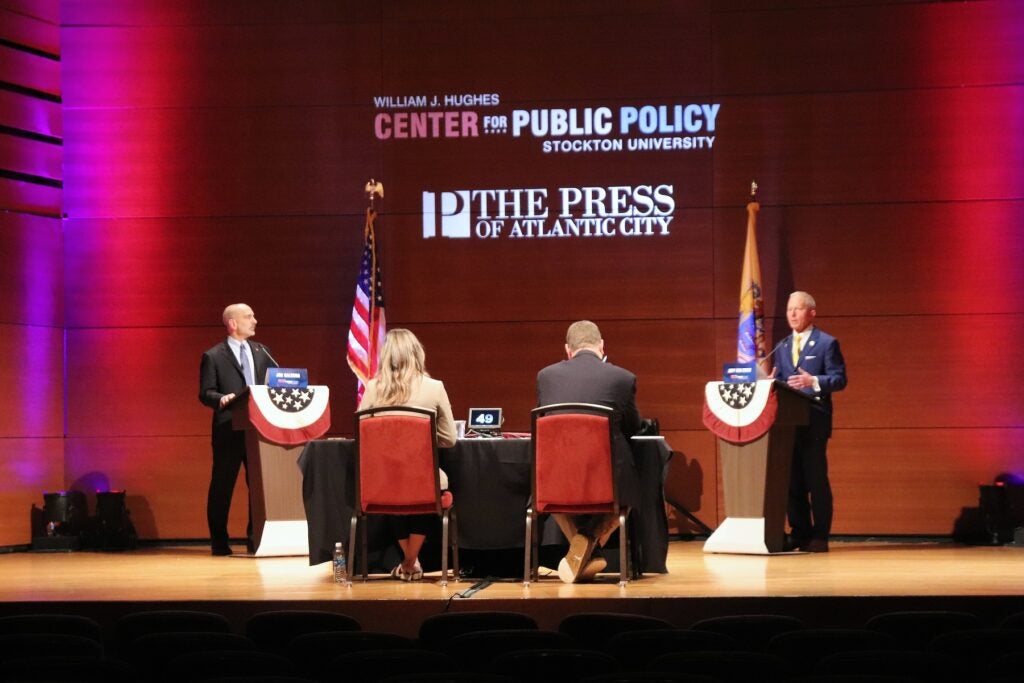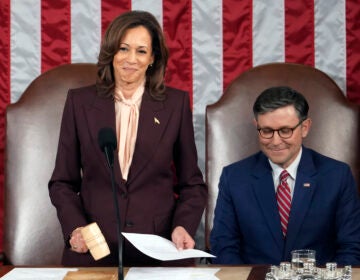Key takeaways from the Van Drew–Salerno debate in New Jersey
The Republican incumbent and Democratic challenger in New Jersey’s 2nd Congressional District debated issues for an hour in an empty auditorium at Stockton University.

Republican incumbent Jeff Van Drew and Democratic challenger Joe Salerno debate at Stockton University. (Mark Melhorn/Stockton University)
N.J. election 2024: Dates to watch
- Deadline to request mail ballot
- By mail: Tuesday, Oct. 29
- In person: Monday, Nov. 4
- Deadline to return mail ballot: Postmarked by 8 p.m. Tuesday, Nov. 5
- Early voting: Saturday, Oct. 26 – Sunday, Nov. 3
What questions do you have about the 2024 elections? What major issues do you want candidates to address? Let us know.
For one hour, Republican incumbent Jeff Van Drew and his Democratic challenger Joe Salerno debated on a wide range of topics including energy, climate change, immigration, border security, the economy and abortion.
Both candidates are running in New Jersey’s 2nd Congressional District.
The debate, hosted by the William J. Hughes Center for Public Policy at Stockton University and the Press of Atlantic City, did not have an audience at the request of the Van Drew campaign.
Ron Filan, Van Drew’s campaign manager, told the Press that not having an audience is “the most appropriate setup” because the congressman has “literally hundreds of active death threats against him.”

The debate was streamed live to the public.
Here are three key takeaways from Thursday night’s debate:
Salerno paints Van Drew as ‘a lackey’
Starting with his opening statement, Salerno characterized Van Drew as “a lackey for his new political party,” referencing the incumbent’s party flip in 2019.
“He had cut a deal with Washington insiders, traded that independence for hits on Fox News,” Salerno said.
Salerno used this line at least two other times, including when Van Drew asserted that the Inflation Reduction Act put millions of dollars to “study the gas expelled out of cow’s backsides and out of their mouths.”
“Wow, I watch Fox News too,” Salerno said.
Politifact found that cattle are the No. 1 agricultural source of greenhouse gas worldwide, with most methane emissions coming from “cow burps.” Also, all cattle-related projects would account for a small fraction of the $8.5 billion allocated for all types of agricultural conservation over four years.
Energy, energy, energy
Van Drew drilled down on energy: nuclear, solar and “some fossil fuels, like clean gas.” Like most Republicans in South Jersey, Van Drew is opposed to offshore wind energy as an option for South Jersey.
“Wind energy can be good, maybe on the mainland, somewhere else,” he said. “It hurts our environment. It hurts our fishermen. It will hurt the ratepayer. If you think you’re paying high rates now, you’re going to pay more than ever.”
Salerno said he “respects” that residents’ concerns about wind energy weren’t “properly considered” but believes there can be a compromise.
“To say offshore wind is unproven is simply a fallacy,” he said.
An Energy Department report found that more than 11,900 wind turbines are operating around the globe, generating enough energy to power more than 59 million homes.
Salerno also asserted that “we can’t make nuclear in time,” citing the expansion of Georgia’s Plant Vogtle expansion that took 15 years to build. The World Nuclear Association said a typical nuclear power plant takes more than five years to build.
When asked what he could do to help people afford housing or how he would bring economic opportunities to South Jersey, Van Drew shifted the focus back to energy.
“Energy is what drives everything,” Van Drew said. “Energy is what farmers need to produce their crops. Energy is what manufacturers need to produce their products. Energy is what we all use in our homes. Energy is too expensive because we have a bad energy policy.”
Van Drew and Salerno agree on SALT
Both candidates agree that New Jerseyans should be able to deduct their state and local taxes, or SALT, on their federal returns.
In 2017, the Republican Congress passed a $1.5 trillion tax overhaul that instituted a $10,000 cap on those who deduct state, local and property taxes on their federal returns.
“There should be no limit on the state and local tax deduction that was implemented by the Trump administration as a punitive assault on blue states,” Salerno said.
Van Drew said “there’s no question in my mind” about whether state and local taxes should be deducted, but adds New Jersey needs to do a better job with budgeting.
“It’s unbelievable in the state,” he said. “Folks that have lived here pretty much their whole lives, they’ll tell you we hear promises over and over again every time they do a new tax.”

Get daily updates from WHYY News!
WHYY is your source for fact-based, in-depth journalism and information. As a nonprofit organization, we rely on financial support from readers like you. Please give today.






